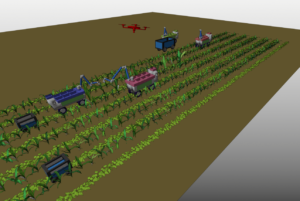Cooperative robots acting at the plant scale for agroecology
The global objective of the project is to define agroecological avenues achievable by an autonomous system composed of several elementary and associable robots acting at the plant scale. The main idea is to propose robotic devices to act on soil and vegetation to conduct technical itineraries fullfilling ecological requirements.
This supposes to associate both robotics and agronomic research for food production, limitating the use of human resources while reducing the work penibility, and ensuring high production levels. The project is designed as a multidisciplinary research with a mutual enrichment between agronomy and robotics, to allow the emergence of new solutions.
Ninsar will consider the development of elementary mobile robots with grasping capabilities, as well as specific tools to act on the soil and the vegetation, to achieve different agricultural tasks. These tasks will be defined thanks to the design of a set of preliminary agroecological avenues (permaculture, biocontrol, … ), addressing several branches of food production (market gardening, vineyard, …). Pending on the context and the agronomic mission, the idea is to allow a collaborative work of these robots, investigating association capabilities, as well as air-soil cooperation.
Ninsar addresses robotics challenges that are in relationship with agroecological applications. It is focused on the coordination of the fleet that implies, both the development of reconfiguration and adaptation process of the robots’ behavior. Advanced interaction with human, which has an important role to play, will be investigated in relationship but appart from that project, as it requires specific developments with social science experts. Only the use of data collection for decision making using human expertise, will then be addressed in the project. Finally, evaluation of environmental impact of using agricultural robot will be evaluated, using Life Cycle Assessment (LCA) method. As a result, Ninsar will also contribute to provide a relevant and reliable method to assess the environmental impact of agroecological practices using robots.




